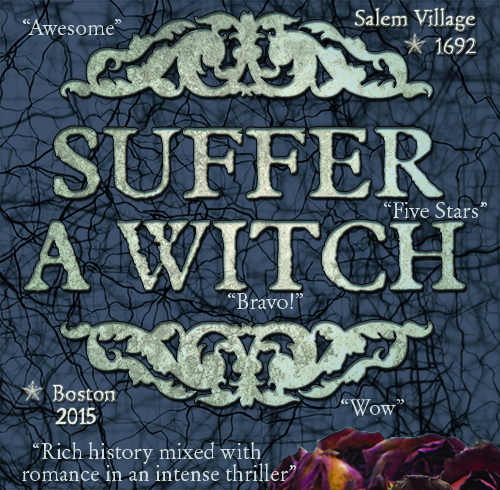When the trolls come for you -- lessons from the Salem Witch Trials.

Internet trolls suck
(This post was originally posted at the MidwifeMidlifeproject in September, 2014)
If you're a woman, and you interact on the Internet, you've probably met an Internet troll. You might have had people threaten to kill you or rape you and cut off your head or send you photos of your father with bruises photoshopped onto his neck. While Twitter and Facebook have released new rules to protect users, we all know that the trolls have won the battle for Internet civility.
As a author, I've had the great displeasure of meeting my fair share of these folks. Like most people, I believed dealing with trolls was a new phenomenon brought about by the anonymous Internet. It wasn't until I started researching the Salem Witch Trials for my new serial fiction, Suffer a Witch, that I realized that this is nothing new.
In times of enormous economic, social, and religious transformation, women are attacked, abused, socially cast out, and killed in a phenomena we now call witch hysteria. Like on today's Internet, in days of old, women over the age of 40 years old were both the victims and the perpetrators of these attacks.
Of course, the government doesn't hang witches anymore. Instead, there is a rising incidence of middle aged men and women hanging themselves.
What can you do when the trolls come for you?
1. You must understand that it is not about you.
Someone has decided there's something wrong with you, your work, and/or the way you live your life. They are incredibly specific in their criticism. It must be about you? Right?
It's not. People feel something -- anger, frustration, or even loneliness -- and use your life to justify venting how they feel.
While there are a lot of theories as to why the witch hunt happened in Salem Village, one of the most salient is that many of the women were widows without sons or brothers who owned large tracts of land. They were hanged as witches because "they stood in the way of orderly transmission of property from one generation of males to another." (Knutson, Devil in the Shape of a Woman, p. 116) They were charged, convicted, and hanged for witchcraft when it's likely that people were jealous and wanted their land.
No matter what the trolls say, it's not about you.
2. Don't bother reasoning with them.
They feed off the pain they cause. They chortle at your anger or fear. If you respond in anyway, they will provoke you more or play the victim. If you say "Ouch," they will mock your pain. If you are compassionate with them, they will be more cruel. Any response is ammunition for them to hurt you more. Don't bother responding.
In Salem Village, most of the people hanged believed they could reason their way out of their situation. The nineteen people believed that if they could prove they were not witches, they would be freed. Some of them stood with a noose around their neck trying to reason with crowd. To a person, they were hanged.
Want to reason with them? Read this article about a few trolls before you respond to yours.
3. Don't retreat, hide, or isolate yourself.
You have nothing to be ashamed of. You've done nothing wrong. In Salem Village, many of the women had previously been accused of witchcraft. Their shame over the accusations made them sitting ducks for the next time someone was angry with them (or wanted their land.)
If someone attacks you, pull your friends close. Don't let a troll steal your magnificence!
4. Practice grace.
Rather than scorch the earth with your rage at being attacked, practice a little grace. Grace, in this situation, sounds like: "In the past, I've said things that injured others. I understand the humanity of the other person."
Human beings bumble through the world killing and injuring other beings. If you doubt me, look at all of the dead bugs on your windscreen after a midday drive or check out your dinner plate.
The troll is human being behaving as human beings do. That's all that was going on. If you'd like to explore this a little further, check out Jack Kornfield's Forgiveness meditation.
5. Stop your own critical gossiping ways.
Seriously. Knock it off. I know that you feel like no one is listening, but your own critical gossiping words find their way out into the world.
You didn't want your neighbor to think he or she was a buffoon. Guess what? They read your Tweet and recognized themselves. You thought your daughter's teacher was a big fat pig? Certainly you didn't want her to know, but she happened to be friends with one of your friends on Facebook and saw your note about her.
Suddenly, you are the troll, the perpetrator, the meanie. (Look up Karpman's Drama Triangle to learn how easy it is for a victim to become a perpetrator.)
You don't need to add your voice to the cacophony of angry voices. Get help if you need it.
How do we stop these attacks?
We can change ourselves.
We need to stop criticizing other people. We can practice grace and compassion. We can focus on connecting with people, both online and in your neighborhood. We can stop pretending like these trolls add to the conversation.
More than anything, we can stop believing that we "caused" someone else's violent, critical behavior.
While our Internet services and the government try to figure out how to protect us from attack, we can be the change we'd like to see in the world.
This post was done as a series to help promote Suffer a Witch, which is available now!

-----
